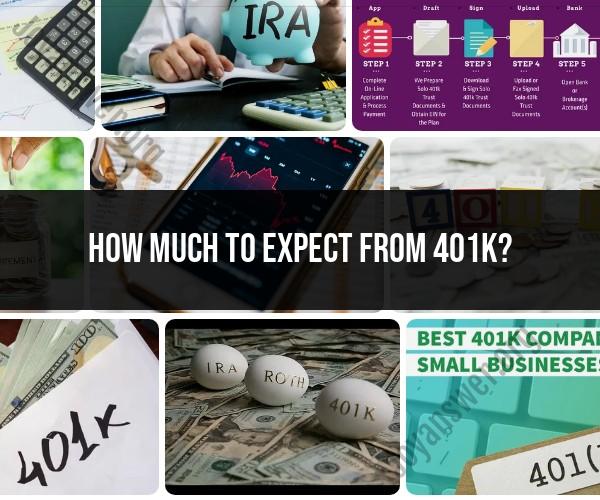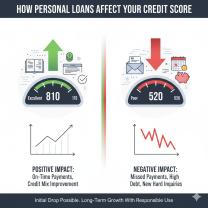How much to expect from 401k?
The amount you can expect from your 401(k) in retirement depends on several factors, including how much you contribute, how your investments perform, how long you contribute, and when you start withdrawing funds. Here are some key factors to consider:
Contribution Amount: The more you contribute to your 401(k) over the years, the larger your retirement savings will be. Many financial advisors recommend contributing at least 10-15% of your pre-tax income to your 401(k).
Employer Matching: If your employer offers a 401(k) matching program, take full advantage of it. This essentially gives you free money towards your retirement savings.
Investment Performance: The returns on your 401(k) investments can significantly impact your savings. The average annual return for a well-balanced portfolio is historically around 7-8%, but this can vary greatly from year to year.
Time Horizon: The longer you contribute to your 401(k), the more time your investments have to grow. Starting early and staying consistent with contributions can make a significant difference.
Withdrawal Age: The age at which you start withdrawing from your 401(k) can affect the final amount. If you withdraw before age 59½, you may face penalties, so it's essential to plan for when you'll start using the funds.
Tax Considerations: Keep in mind that 401(k) withdrawals in retirement are typically subject to income tax. This means that the amount you have in your 401(k) isn't entirely yours; you'll owe taxes when you withdraw.
Inflation: Consider the impact of inflation on your retirement savings. Over time, the purchasing power of your savings will decrease, so you'll need to account for inflation when estimating how much you'll have in retirement.
To estimate how much you can expect from your 401(k), you can use retirement calculators and work with a financial advisor who can provide a personalized projection based on your specific circumstances. Keep in mind that these projections are just estimates and that the actual amount you have in retirement may vary due to unforeseen factors.
It's also important to have a diversified retirement strategy, which may include other forms of savings and investments, such as IRAs, Social Security, pensions (if applicable), and other assets, to provide a well-rounded retirement income plan. Regularly reviewing and adjusting your retirement savings plan is crucial as your financial situation and goals may change over time.
Planning for Retirement: What to Expect from Your 401(k)
A 401(k) is a retirement savings plan offered by many employers. It allows you to save a portion of your paycheck before taxes are taken out. This money is then invested in your choice of investment options, such as mutual funds or stocks.
Your 401(k) can be a valuable tool for saving for retirement. However, it's important to understand how it works and what to expect from it.
Here are a few things to keep in mind:
- Your contributions are pre-tax. This means that the money you contribute to your 401(k) is deducted from your paycheck before taxes are taken out. This can lower your taxable income and save you money on taxes.
- Your money grows tax-deferred. This means that you don't have to pay taxes on the earnings in your 401(k) until you withdraw the money. This allows your money to grow tax-free over time, which can help you reach your retirement goals faster.
- You have investment choices. Most 401(k) plans offer a variety of investment options, such as mutual funds and stocks. You can choose the investments that are right for you based on your risk tolerance and investment goals.
- You may be able to get an employer match. Many employers offer to match a portion of their employees' 401(k) contributions. This is essentially free money, so it's important to contribute enough to get the full match if possible.
Navigating 401(k) Contributions: Understanding Your Retirement Savings
When you start contributing to your 401(k), it's important to understand how much you need to save to reach your retirement goals. There are a few different ways to calculate this.
One way is to use a retirement calculator. These calculators can help you estimate how much money you'll need in retirement based on your age, income, expenses, and other factors.
Another way to calculate how much to save is to use the 4% rule. This rule of thumb says that you can withdraw 4% of your retirement savings each year without running out of money.
Of course, the best way to determine how much to save is to meet with a financial advisor. They can help you develop a personalized retirement plan that takes into account your individual needs and goals.
Anticipating Your 401(k) Returns: Setting Realistic Expectations
The amount of money you earn in your 401(k) will depend on the performance of your investments. It's important to set realistic expectations for your returns.
The average historical return for the stock market is about 10% per year. However, it's important to remember that past performance is not indicative of future results. The stock market can be volatile, and there will be years when it loses money.
A good rule of thumb is to expect your 401(k) to return about 7% per year over the long term. This is a conservative estimate that takes into account the volatility of the stock market.
Conclusion
A 401(k) can be a valuable tool for saving for retirement. However, it's important to understand how it works and what to expect from it. By setting realistic expectations and making regular contributions, you can reach your retirement goals and enjoy a comfortable retirement.
Here are some additional tips for getting the most out of your 401(k):
- Start saving early. The earlier you start saving, the more time your money has to grow.
- Increase your contributions over time. As your income increases, try to increase your 401(k) contributions as well.
- Rebalance your portfolio regularly. As you get closer to retirement, you may want to rebalance your portfolio to include more conservative investments.
- Consider working with a financial advisor. A financial advisor can help you develop a personalized retirement plan and choose the right investments for your needs.











